Table of Contents
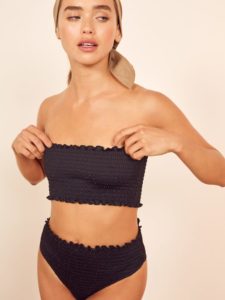
Our top pick
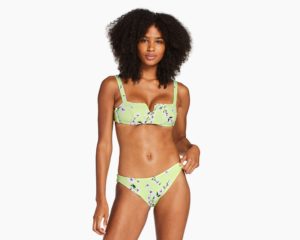
Runner up
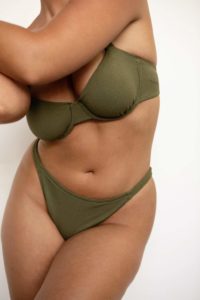
Third pick
Call me crazy but once April rolls around in the Pacific Northwest, it’s only a matter of time before my first ocean swim. Sure, it’s darned cold in the water, but that just makes it all the more refreshing! You know what else is refreshing? Swimwear brands that keep sustainability and ethics front and center.
Long the purview of fast fashion, swimwear has finally taken the plunge with better options for people and planet. These stylish options are designed to last for more than just one summer season and are often made with recycled materials to help minimize their eco-footprint. If you’re looking for a new swimsuit, bikini, or tankini, go green (whatever color you choose) with my top picks for the best eco-friendly swimwear brands for 2021. You can read about our unique research process here.
NB: It’s hard to award any of the contenders 5 leaves, given that pretty much all swimwear is made with plastics in some form or other. That said, because Reformation are just astonishingly engaged on the environmental front, and Vitamin A led the way in creating recycled fiber textiles and their plant-based swimwear line, I’m giving them a 5/5 to help clearly differentiate them from the rest of the pack.

Reformation
Highlights: Fun swimwear in a variety of prints made with regenerated Econyl® fibers by a company that clearly cares about the environment and is taking impressive action to preserve and protect the planet.
Based in Los Angeles, Reformation are my top choice for eco-friendly swimwear. Their separates and one-pieces (and beach bags) are made using deadstock (i.e. fabric off-cuts that would be otherwise discarded) and recycled fabrics. This includes their Ref Swim line made with Econyl® (regenerated nylon from fishing nets, carpet fluff, and scrap textiles) and other regenerated fibers. Because this is technically plastic, you’re going to need a GuppyFriend Washing Bag to wash your swimwear without accidentally sending microplastics into the waterways.
Reformation’s swimwear is distinctive not just for its eco-friendliness but also for the fun prints. From tie-dye to leopard to floral to abstract, Reformation designs are pretty eye-catching. The swimwear range is available in XS to XL and ranges from around $58 for separates to $95 for one-pieces.
Reformation also employ eco-friendly manufacturing practices and are highly transparent about their environmental and social responsibilities and actions. They publish a quarterly sustainability report that includes info on their efforts to minimize waste, water use, and their energy footprint. The company is also engaged in ongoing training and education of their workers and has a diverse management team with a high degree of female and minority representation.
Reformation use RefScale to track the environmental footprint of their products, adding up carbon dioxide emissions, water used, and waste generated. This info is listed right beside every item of swimwear on their website, which is about as good as it gets in choosing eco-friendly clothing that doesn’t cost the Earth. Their commitment to sustainability means they require suppliers to meet minimum standards for social responsibility, safe and non-toxic materials.
All of the chemicals used to create Reformation products, including dyes and finishes, are checked against the Restricted Substances List which you can see here. Many of their garments are Bluesign certified as safe for the end user, workers, and the environment, and/or Oeko-Tex 100 certified as containing no carcinogens, azo dyes, or other chemicals above limits set out by the European REACH standards.
Through partnerships with the Brazilian Rosewood Amazon Conservation Project and the Bonneville Environmental Foundation (BEF) Water Restoration Program, Reformation are also helping to protect and restore the natural environment. Their aim is to offset or exceed in replacing any resources they spend in making their products. Even the clothing hangers in their stores are made of recycled paper and they use recycled fabric insulation. Their stores are also Green Business certified and the majority of products are manufactured in LA.
The company believes itself to have been both water-neutral and carbon-neutral since 2015 and are working towards official carbon-neutral status with Climate Neutral, a non-profit auditor. This zero-carbon status comes largely through electricity offsets from wind power suppliers, the use of LED lighting and Energy Star rated appliances in offices. They currently recycle about 75% of waste and are striving to become zero waste. This includes recycling, composting, and donating textile scraps. Oh, and they subsidize public transit costs for their workers and even offset the carbon footprint of their web server and the energy consumers use when browsing the site!
Honestly, I could list even more of Reformation’s efforts at sustainability, including using only recycled pens and reclaimed furniture in the office, but you’re here for swimwear. So, suffice it to say that if you want the best of the best sustainable, eco-friendly swimwear, Reformation is where it’s at.
Any downsides? Only one that I can see: Reformation’s love for Tencel Lyocell. They love this fabric, claiming it is super eco-friendly. Alas, while this fiber is made using a closed-loop production process involving non-toxic solvents, with a 99% chemical recovery rate, it’s only as sustainable as the source of bamboo, and it’s not clear where Reformation gets that bamboo.

Vitamin A
Highlights: An industry leader for recycled nylon fabric swimwear with a 1970’s laidback Cali feel. For serious eco-friendliness, though, check out their BioSculpt range, made with plant-based raw materials.
Based in California, Vitamin A makes 1970’s inspired laidback, Cali-vibe swimwear out of recycled fabrics such as EcoLux™ and EcoRib®, both made from regenerated nylon. Their separates start at $78 and one-pieces at $154, and sizes range from 4 (XS) to 14. The company has taken a number of steps to minimize the environmental impact of their manufacturing processes, including using water-conserving digital printing technology and recyclable and biodegradable packaging that is Forest Stewardship Council certified.
We might also want to applaud Vitamin A’s founder, Amahlia Stevens, with kickstarting the eco-friendly swimwear movement. That’s because Stevens founded Vitamin A in 2000 after working on a design project with Patagonia founder and environmentalist Yvon Chouinard. At the time, Patagonia were using recycled plastic bottles in their technical wear and Stevens wondered if the same processes could be used to make swimwear. After getting little encouragement from textile makers skeptical of the market for recycled fibers for swimwear, Stevens went ahead and spent three years working hard to create EcoLux™, arguably the first swim fabric made from regenerated nylon.
Vitamin A has introduced several other sustainable high-performance swim fabrics since then and all their materials are certified to Oeko-Tex standard 100. EcoLux™ is produced using significantly less water than typical swimwear textiles and has lower associated greenhouse gas emissions and energy consumption. Their EcoRib® fabrics is a stretch-ribbed swim fabric made from nylon fiber scraps that would otherwise end up in landfill. This fabric is lightweight, breathable, and is made in California using mechanical rather than chemical regeneration, saving (according to Vitamin A) some 0.63 liters or oil and 33 liters of water per meter of fabric. EcoTex is a similar, but scrunchier material.
Best of the bunch though, in terms of sustainability, is Vitamin A’s BioSculpt fabric. This is made using plant-based fiber created from castor beans, with most one-pieces in this line comprising 77% Plant-Based Polyamide and 23% Lycra spandex fiber. BioSculpt offers a refreshing organic alternative to purely fossil fuel-based nylon swimwear fabrics. This eco-friendly swimwear line is gorgeous but a little pricier, starting at $125 for separates and $240 for one-piece bodysuits. Available in Sangria, Sapphire, and Black, this swimwear looks great in and out of the water and has sculpting panels for added support.
Vitamin A donates a portion of proceeds directly to environmental organizations that work to protect oceans. They are also partnered with One Planted Tree, which plants a tree for every dollar donated. Their goal is to make sustainable beachwear that will last for years to come and they do this, wherever possible, in vertically integrated facilities. This means that dyeing, knitting, and other processes are done at one location, which helps reduce the carbon footprint of the products. For products that aren’t made in California, Vitamin A partners with fair trade artisans and maintains high standards for safe working conditions and fair labor.
Oh, and Vitamin A even use one of our top smart thermostat picks, the Google Nest thermostat (View Price on Walmart), in every individual office to provide intelligent heating and cooling based on occupancy and thus reduce energy consumption.

Peony
Highlights: A small but mighty Australian brand making socially responsible and sustainable swimwear from entirely recycled or natural materials.
Peony is a family-run business that makes beautiful boutique swimwear and resortwear from low-impact materials, all of which are recycled or otherwise sustainable. They take care to create high quality long-lasting trims, boning, soft removable cups, and corrosion resistant hardware, so you can keep loving your swimwear for years to come. And they ship everything in biodegradable and compostable packaging. Peony is an Australian company, but international shipping is free for orders over $150.
The printed swimwear components are made mainly from Econyl®. And, unlike some swimwear brands that stop at the printed outer component, Peony also make their textured fabrics and linings in-house using recycled fiber such as Repreve®, which is made mainly from recycle plastic bottles. Fabrics are Oeko-Tex 100 certified as having minimal residues of any harmful chemicals.
Peony swimwear and resortwear suppliers are also SA8000 approved (the only swimwear brand I’ve found that has this certification for suppliers). SA8000 is given to factories that maintain ethical and fair labor conditions including no child labor or forced labor, and where protections are in place for worker health and safety and the right to collective bargaining and freedom from discrimination.
Peony’s resortwear is made mainly with natural fibers, including organic cotton, hemp and linen, as well as EcoVero, a fiber derived from wood pulp and EU Ecolabel certified.
Peony are also looking to launch a recycling initiative to ‘close the loop’ in their production processes. They haven’t yet announced details, but this sounds like it may be similar to Hackwith Design House’s Sustain Shop, but possibly better if it includes swimwear. The company also takes pains to minimize their footprint through in-house sampling using leftover fabrics from previous collections, recycling wherever possible, and putting electronics on timers to reduce energy waste. Their goal is to be completely sustainable by 2021, and though they aren’t clear on a definition, it’s a laudable aim.

Arkitaip
Highlights: Unique hand crocheted swimwear made in Vienna with new linen, recycled linen, and lined with Econyl®.
If you’re looking for swimwear that’s a little bit different and a touch more delicate than most offerings, check out Arkitaip. This European mother-daughter brand makes crocheted knitwear in Vienna by hand from linen and lines the tops and bottoms with Econyl®. They use recycled polyester bags for shipping and hang-tags made from recycled cotton T-shirts, and even turn their leftover fabric into hair scrunchies.
The antithesis of fast-fashion, every item is handmade to order and is totally unique. Michi (the mom of the outfit) takes between 8 and 30 hours to make every piece, with the linen yarn made from 80% recycled and 20% virgin linen, a durable, low-impact eco-friendly material.
As a very small company, Arkitaip aren’t able to boast any specific eco-certifications or vast giving programs, but they seem like the real deal in terms of environmentally friendly, boutique swimwear that will set you apart from the crowd.
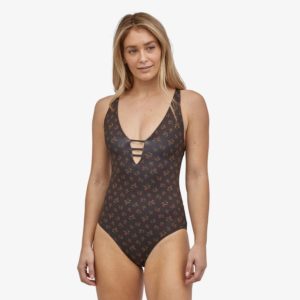
Patagonia
Highlights: One of the most eco-friendly companies around, Patagonia offer a wide selection of mostly recycled swimwear, but have room for improvement!
California-based Patagonia have long been an industry leader for recycled and sustainable technical wear, including some of my top picks for down alternative winter coats. It’s no great surprise, then, that Patagonia also make some excellent eco-friendly swimwear, albeit not quite as eco-friendly as Reformation, Vitamin A, or Peony. The Patagonia collection is very extensive though, and far easier to find in stores than many other brands. The collection includes separates, one-pieces, rashguards, and boardshorts, starting at $45 and available in XXS to XXL sizes.
Patagonia has now transitioned all of their swimwear to fair trade sewn products and focuses on recycled fabrics. Around 83% of the outer layer of their swimsuits is made with recycled polyester from landfills and around 33% of the inner layer is also made with recycled polyester.
As a company, Patagonia is a leader in sustainability. Their aim is to be carbon-neutral by 2025, nearly three quarters of their products are made with recycled materials, and all of the electricity they use in the US is sourced from renewables.
They’ve also been instrumental in shifting industry standards towards greater environmental responsibility and since 1985 have pledged to donate 1% of sales to the preservation and restoration of the natural environment. In 2002, Patagonia founder, Yvon Chouinard and Craig Mathews, owner of Blue Ribbon Flies, created 1% for the Planet, a non-profit corporation to encourage other businesses to do the same.
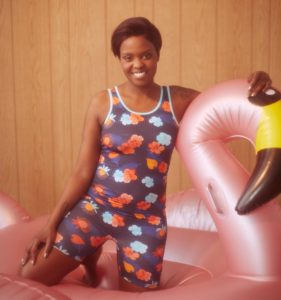
TomboyX
Highlights: Innovative company breaking the mold for eco-friendly swimwear for all that incorporates a natural antibacterial chitosan treatment.
Seattle-based TomboyX make stylish and fun swimwear for everybody. Their playful tanks, halter tops, unisuits and other designs are a refreshing change from the typical LBB (little black bikini) and are a great choice whatever your gender.
TomboyX use Oeko-Tex certified fabrics including recycled materials and treat them with an innovative chitosan-based material to create fabrics that are naturally antibacterial, odor resistant, pill-resistant, anti-static, breathable, fast drying/wicking and soft. Chitosan is sourced from the exoskeleton of crabs and shrimp, typically from fishing industry waste that would otherwise end up in landfill. As such, it seems like a fitting material to make its way back into the ocean, this time by upping the game of your kickass swimwear. Indeed, Chitosante is certified as an ecological product by Intertek Testing Services.
TomboyX make swimwear to fit XS to 4X and separates start at $44, while one-pieces start at $89. I absolutely adore their unisuits, which are perfect for more active beach activities. No more need to worry about bikini mishaps while surfing or swimming. Check out their narwhal design too.
This company works with women-owned factories in the US and China who have sound labor practices and environmental stewardship. They aim to avoid any toxic chemicals in their manufacturing processes and final products and test the fabrics for a lengthy list of chemicals known or suspected to be harmful to health. They also take care to use only fabrics that are skin friendly, i.e. that have a safe pH and feel smooth against the skin.
There’s no place for ‘fast fashion’ and its unsustainable practices at TomboyX. These folks are far too busy making fantastic all-gender swimwear that looks great and will serve you well for years to come. Speaking of which, they offer a range of swimwear that is adjustable, making it ideal for anyone going through physical changes due to pregnancy or hormone treatment.
TomboyX are also a generous donor to a whole host of worthy causes. In the last two years alone the company has donated over $100k to various non-profits.
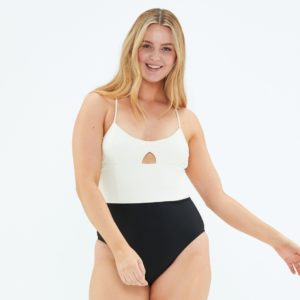
Summersalt
Highlights: Loud and proud swimwear made with mostly recycled materials and super durable and strong!
Summersalt make bold swimwear from majority recycled textiles in loud and proud prints, starting at $45 for separates and $95 for one-pieces in sizes XS to 2X. Most pieces are made using 78% recycled polyamide, largely from recycled plastics and post-consumer materials like, you guessed it, fishing nets.
Summersalt are a Montana based business that takes sizing seriously. Their TrueMeasure process relies on 1.5 million body measurements form 10,000 women to perfect the fit of all their swimwear. Take their Size + Style Finder quiz for guidance on the right swimwear for you.
This swimwear brand is particularly good for anyone looking for durable, strong fabrics that offer more support and compression. Summersalt claim that their fabric is five times stronger than regular swimwear, with four times the compression capability, which likely means more comfort for you and a longer life for your garments.
Summersalt ship their swimwear in recycled packaging and because the swimsuits offer UPF 50+, you can cut down on your sunscreen use under your suit. They also recommend avoiding avobenzone based sunscreens because these can stain. I also recommend avoiding such sunscreens, but mainly because they’re a health nightmare.
This swimwear should be washed by hand in cold water with gentle soap. Due to the risk of microplastics getting into the waterways, use a Guppy bag (view on Patagonia) when washing the swimwear, avoid soaking and hang to dry. They recommend sizing down if you’re between sizes as a swimsuit should fit snug when dry. Otherwise, sizes run true for most customers. Conveniently, Summersalt encourage you to order a few sizes and keep whatever fits, and they offer free returns and exchanges!
Summersalt also offer a travelwear range made with ‘vegan silk’, i.e. fiber created from pre-consumer waste like leftover cotton lint.
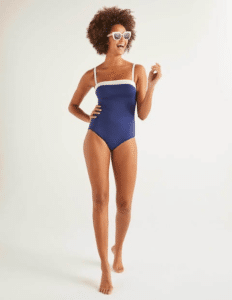
Boden
Highlights: Boden, a brand with a reputation for durability and quality, are making waves with their new eco-swimwear line and plan to have their whole swimwear range sustainable by 2025.
London based Boden are a trusted brand on a mission to up their eco-game. They make gorgeous separates and swimsuits in a range of styles, from bold geometrics to fun prints and more classic and softer aesthetics. They also make some of the cutest eco-friendly kids swimwear I’ve seen. Not all of their swimwear is made with recycled materials though, so be sure to check their Econyl® range made with regenerated nylon.
Boden, established in 1991, have a reputation for quality and social responsibility, so it’s good to see them taking more concrete steps towards sustainability with their newly launched Econyl® swimwear line (fresh for October 2019). They already use eco-friendly boxes and shipping bags made from 80% recycled material (with plans to improve this further). Their Leicester warehouse has a zero-to-landfill policy and they use rainwater for the bathrooms. Their US warehouse is adopting similar measures, and recycled 95 tons of cardboard and six tons of plastic in 2018 alone.
They also offer a 365-day return policy (for exchange or credit), demonstrating their confidence that your swimwear will last more than just one season. And they’re looking at other sustainability measures such as composting in their offices and sourcing sustainable paper for their catalogs.
Boden have also made some public pledges, such as using 100% sustainable viscose by 2025, using raw wood harvested from sustainably managed forests; using sustainably sourced cotton by 2025, including organic, recycled, Fairtrade, and Better Cotton Initiative cotton. Ambitiously, they plan to have their entire swimwear line be 100% regenerated or recycled by 2025, using yarn created from waste materials only.
Boden takes social responsibility seriously too, having joined the Ethical Trade Initiative (ETI) in 2008 and established their Responsible Sourcing Commitment (RSC) then too. This requires suppliers to adhere to and ideally exceed strict standards for the “health, safety, hygiene, minimum working age, working hours and remuneration of workers.”
Despite their humble origins, the company now directly employs around 1,200 people and works with 92 suppliers that employ more than 64,000 people. Hopefully, this demonstrates the potential impact of a single company policy change in worker conditions. Indeed, Boden is incredibly transparent about where their products are made, publishing a list of their factories, which products are made where, and the gender breakdown at factory level. Right now, Boden’s swimwear is produced in Cambodia and China, and they make a point of visiting factories to audit conditions.
Boden are also a company that gives back, with longstanding relationships with Dress for Success, Rainbow Trust and Starlight. Their current main cause is fundraising for the Charlie Waller Memorial Trust, a mental health charity.
So, all things considered, this is swimwear you can feel good about and look darned good wearing. Once Boden switch their whole range to regenerated fabrics, I’ll likely up their leaf score. For now, though, I’m eager to see where they go with their sustainability initiatives.
Separates start are $38 and one-pieces at $85 in sizes XS to XL.

Hackwith Design House
Highlights: Limited edition, made-to-order swimwear sewn in-house in Minnesota using spandex and recycled polyester. HDH also have an innovative Sustain Shop where their non-swimwear items can be returned for credit and refreshed for resale.
Hackwith Design House make classic, timeless swimwear with a modest cut at an affordable price, thanks to their direct to consumer model. These separates and swimsuits start at $42, with sizes ranging from XS to XL, and are made to order in Minnesota using spandex and around 74% recycled polyester.
The company launched in 2013 with one limited-edition design and now releases a limited edition design every week, with no more than 25 of each design made. Their collection has grown from a core collection to include swimwear, basics, plus sizes, and intimates.
HDH aim to keep waste to a minimum in part by making most items to order. They have also launched a Sustain Shop, where old HDH pieces are refreshed, repaired, or redesigned to give them a second life. Customers that send back HDH pieces that no longer work for them and get credit towards new items or other items in the Sustain Shop. Unfortunately, swimwear and intimates are not included in this system.
HDH swimwear should be handwashed cold and hung or laid flat to dry. Don’t bleach or iron the swimwear and consider using a Guppy bag when washing, to minimize the risk of microplastics entering waterways.
One of my top picks from Hackwith Design House is their Tear Drop Tie Top, which is available in white, thistle, valentine red, chestnut, and black and is currently priced at $78.
Materials to consider for eco-friendly swimwear
Conventional swimwear is made of new nylon and polyester, which is plastic. As such, it requires significant energy and chemical inputs to produce, doesn’t biodegrade, and poses a high risk to the environment and, potentially, to the health of the wearer. Rather disconcertingly, a 2015 report found that a quarter of fish sold in markets in California contained plastic.
So, what’s the alternative? In short, recycled nylon and polyester. That’s right, when it comes to swimwear, certain fabrics just perform better than others, meaning that manufacturers still tend to favor swimwear made with synthetic fibers. The good news is that a whole host of companies have begun switching their swimwear lines to designs made with recycled plastic bottles and fishing nets. This helps to clear plastic debris from the ocean and keep it out of landfill. It also helps to reduce resource consumption overall.
The downside, though, is that swimwear remains far from truly eco-friendly. Those plastic fibers don’t biodegrade but they can degrade, which means that microplastics can enter waterways and chemicals may leach from synthetic swimwear.
While it’s not a perfect solution, the GuppyFriend Washing Bag is a convenient way to contain microplastics shed from clothing as it’s washed. This laundry bag is itself made of nylon but has a fine mesh of 50 microns that retains fibers from any clothes washed inside the bag. It was tested and co-financed by Patagonia and is recommended for washing any swimwear or other garments made with nylon, polyester, and other plastic fibers.
Aside from using recycled fibers, some swimwear companies (such as Arkitaip) are taking steps to minimize their environmental impact by using fabrics made with natural fibers lined with recycled synthetics. Vitamin A is also the first brand to create a mostly plant-based swimwear line, by using their patented BioSculpt material.